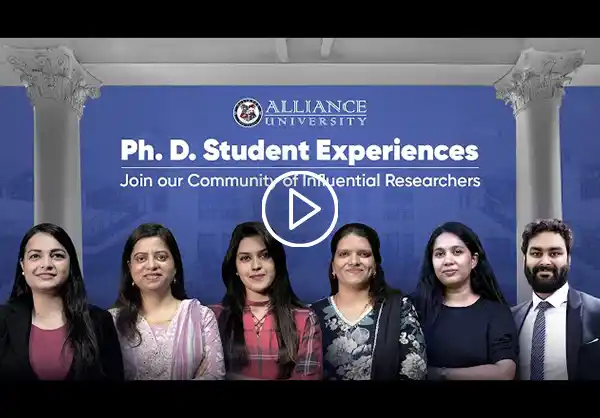Admission Enquiry
HELPLINE:
+91 81050 14564 / +91 73534 73872
Programmes
Ph. D. in Public Policy
Overview
To create and support an environment of rigorous, systematic, and scientific evidence-based research with the integration of social sciences and allied disciplines in the field of ESG, sustainability and public policy making and, foster a culture of sustainable and inclusive policy to create social change.
Salient Features
Research fellowship of Rs. 35,000 per month and a research allowance of Rs. 25,000 per year for full-time scholars.
Monetary support for attending national and international conferences for full-time research scholars.
Facility for transfer of research scholars from other universities or research institutions to Alliance University and vice-versa.
Extensive interaction with luminaries.
11 Centres of Excellence, fostering innovation and cutting-edge research.
Research projects worth 5+ crores from government and non-government agencies.
Guidance, including 40+ Ivy League supervisors.
Central Instrumentation Facility - AUSTIC established to serve as the cornerstone of scientific advancement offering researchers access to state-of-the-art equipments.
Centre of Excellence in Public Policy, Sustainability and ESG Research promotes and facilitates multidisciplinary research with a focus on sustainability and inclusivity.
Numerous subscribed data bases such as IEEE, Scopus, Scival, Ebsco, Dervent, Case Center, and Harvard Case studies.
Commence of the course
Course Duration
Mode of Study
Eligibility
- Candidates who have completed:
- A 1-year / 2-semester master's degree programme after a 4-year / 8-semester bachelor’s degree programme or a 2-year / 4-semester master’s degree programme after a 3-year bachelor’s degree programme or qualifications declared equivalent to the master’s degree by the corresponding statutory regulatory body, with at least 55% marks in aggregate or its equivalent grade in a point scale wherever grading system is followed or equivalent qualification from a foreign educational institution accredited by an assessment and accreditation agency which is approved, recognized or authorized by an authority, established or incorporated under a law in its home country or any other statutory authority in that country to assess, accredit or assure quality and standards of the educational institution
- A relaxation of 5% marks or its equivalent grade may be allowed for those belonging to SC / ST / OBC (non-creamy layer) / Differently-Abled, Economically Weaker Section (EWS) and other categories of candidates as per the decision of the Commission from time to time
- Provided that a candidate seeking admission after a 4-year/8-semester bachelor’s degree programme should have a minimum of 75% marks in aggregate or its equivalent grade on a point scale wherever the grading system is followed. A relaxation of 5% marks or its equivalent grade may be allowed for those belonging to SC / ST / OBC (non-creamy layer) / Differently-Abled, Economically Weaker Section (EWS) and other categories of candidates as per the decision of the Commission from time to time
- Candidates who have completed the M.Phil. programme with at least 55% marks in aggregate or its 10 THE GAZETTE OF INDIA : EXTRAORDINARY [PART III—SEC.4] equivalent grade in a point scale wherever grading system is followed or equivalent qualification from a foreign educational institution accredited by an assessment and accreditation agency which is approved, recognized or authorized by an authority, established or incorporated under a law in its home country or any other statutory authority in that country to assess, accredit or assure quality and standards of educational institutions, shall be eligible for admission to the Ph.D. programme:
- A relaxation of 5% marks or its equivalent grade may be allowed for those belonging to SC / ST / OBC (non-creamy layer) / Differently-Abled, Economically Weaker Section (EWS) and other categories of candidates as per the decision of the Commission from time to time
Objectives
- Promote and facilitate multidisciplinary research with focus on sustainability and inclusivity.
- Undertake cutting edge ESG research with focus on just transition and due diligence strategies.
- Contribute to the national SDG 2030 objectives and create effective intervention strategies for implementation at the local level.
- Facilitate research and development programs for political leaders and enable them to design campaign strategies, political decision making, leadership and policy analysis.
- Contribute towards scientific and rigorous research on currents issues of social development, global justice, economic studies, law and justice reforms and futurist studies.
Research Project
- Promoting Gender Equality through Social Norm Intervention: Improving Retention of Adolescent Girls in Schools.
- A Study of Post International Sports Event Liability and its Impact on Environment and Marginalized Communities.
- Strengthening Climate Resilience through Indigenous Knowledge: Case Study of Nilgiris Biosphere Reserve.
- Green Criminology and Transformative policing.
- Food Fortification Policy in India.
- An Integrated Legal Framework for AI And Copyright: With Special Reference to Attribution of Authorship and Ownership of AI-Generated Content.
- A Taxonomical approach to outcome-based Education.
Multiple Disciplines
- Economics and Public Policy
- Climate Justice and Sustainability
- ESG and Business Sustainability
- Social Policy
- Business Governance and Society
- International Governance
- Sustainability
- Disaster Management
- Psephology and Elections
- Policy and Politics
Ph. D. Student Experiences
 Open Hours
Open Hours
Monday to Saturday: 10:00 AM to 5:00 PM

 Call Us
Call Us